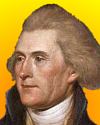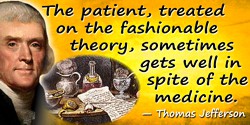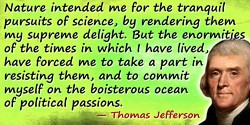 (source)
(source)
|
Thomas Jefferson
(13 Apr 1743 - 4 Jul 1826)
American statesman, astronomer, scholar and inventor who wrote the Declaration of Independence (1776) and organized the Lewis and Clark expedition (1803). His only full-length book, Notes on the State of Virginia contains an outline of the geography, flora and fauna of Virginia, and established his reputation as a scholar and a pioneering American scientist.
|
Thomas Jefferson Quotes on Medicine (4 quotes)
>> Click for 66 Science Quotes by Thomas Jefferson
>> Click for Thomas Jefferson Quotes on | Chemistry | Life | Science |
>> Click for 66 Science Quotes by Thomas Jefferson
>> Click for Thomas Jefferson Quotes on | Chemistry | Life | Science |
I have lived myself to see the disciples of Hoffman, Boerhaave, Stalh, Cullen, Brown, succeed one another like the shifting figures of a magic lanthern, and their fancies, like the dresses of the annual doll-babies from Paris, becoming from their novelty, the vogue of the day, and yielding to the next novelty their ephemeral favor. The patient, treated on the fashionable theory, sometimes gets well in spite of the medicine.
— Thomas Jefferson
In letter to Caspar Wistar (21 Jun 1807), collected in Thomas Jefferson Randolph (ed.), Memoir, Correspondence, And Miscellanies, From The Papers Of Thomas Jefferson (1829), Vol. 4, 93.
One of the most successful physicians I have ever known, has assured me, that he used more bread pills, drops of colored water, and powders of hickory ashes, than of all other medicines put together. It was certainly a pious fraud.
— Thomas Jefferson
In letter to Caspar Wistar (21 Jun 1807), collected in Thomas Jefferson Randolph (ed.), Memoir, Correspondence, And Miscellanies, From The Papers Of Thomas Jefferson (1829), Vol. 4, 93.
The inexperienced and presumptuous band of medical tyros let loose upon the world destroys more of human life in one year than all the Robin Hoods, Cartouches, and Macheaths do in a century.
— Thomas Jefferson
In letter to Caspar Wistar (21 Jun 1807). Memoir, Correspondence, And Miscellanies, From The Papers Of Thomas Jefferson (1829), Vol. 4, 93. (Jefferson regards Robin Hood as a villain, on a par with with Cartouche, an 18th-century highwayway, and Macheath, the cutthroat in John Gay’s Beggar’s Opera.)
The only sure foundations of medicine are, an intimate knowledge of the human body, and observation on the effects of medicinal substances on that. The anatomical and clinical schools, therefore, are those in which the young physician should be formed. If he enters with innocence that of the theory of medicine, it is scarcely possible he should come out untainted with error. His mind must be strong indeed, if, rising above juvenile credulity, it can maintain a wise infidelity against the authority of his instructors, and the bewitching delusions of their theories.
— Thomas Jefferson
In letter to Caspar Wistar (21 Jun 1807), collected in Thomas Jefferson Randolph (ed.), Memoir, Correspondence, And Miscellanies, From The Papers Of Thomas Jefferson (1829), Vol. 4, 93.
See also:
- 13 Apr - short biography, births, deaths and events on date of Jefferson's birth.
- Thomas Jefferson - context of quote “To indulge in the rich fields of nature” - Medium image (500 x 250 px)
- Thomas Jefferson - context of quote “To indulge in the rich fields of nature” - Large image (800 x 400 px)
- Thomas Jefferson - context of quote “The plough ... is really like sorcery” - Medium image (500 x 250 px)
- Jefferson As A Man Of Science - Preface to The Writings of Thomas Jefferson, Vol. 19.
- Thomas Jefferson - context of quote “The plough ... is really like sorcery” - Large image (800 x 400 px)
- Thomas Jefferson on Education and Science from a report on establishing the University of Virginia (1818).
- Thomas Jefferson - context of quote “Chemistry … among the most useful of sciences” - Medium image (500 x 250 px)
- Thomas Jefferson - context of quote “Chemistry … among the most useful of sciences” - Large image (800 x 400 px)
- Thomas Jefferson - context of quote “The patient … sometimes gets well in spite of the medicine. ” - Medium image (500 x 250 px)
- Thomas Jefferson - context of quote “The patient … sometimes gets well in spite of the medicine. ” - Large image (800 x 400 px)
- Thomas Jefferson on Quack Medicine - from Letter to Dr. Caspar Wistar (1807)
- Thomas Jefferson - context of quote “Nature intended me for the tranquil pursuits of science” - Medium image (500 x 250 px)
- Thomas Jefferson - context of quote “Nature intended me for the tranquil pursuits of science” - Large image (800 x 400 px)
- Thomas Jefferson - context of quote “The ocean ... like the air, is the common birthright of mankind” - Medium image (500 x 250 px)
- Thomas Jefferson - context of quote “The ocean ... like the air, is the common birthright of mankind” - Large image (800 x 400 px)
- Thomas Jefferson: Scientist, by Edwin Thomas Martin. - book suggestion.




 In science it often happens that scientists say, 'You know that's a really good argument; my position is mistaken,' and then they would actually change their minds and you never hear that old view from them again. They really do it. It doesn't happen as often as it should, because scientists are human and change is sometimes painful. But it happens every day. I cannot recall the last time something like that happened in politics or religion.
(1987) --
In science it often happens that scientists say, 'You know that's a really good argument; my position is mistaken,' and then they would actually change their minds and you never hear that old view from them again. They really do it. It doesn't happen as often as it should, because scientists are human and change is sometimes painful. But it happens every day. I cannot recall the last time something like that happened in politics or religion.
(1987) -- 


